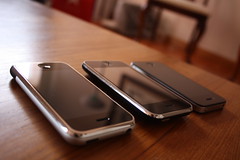 |
| iPhone 2g, iPhone 3GS, iPhone 4 (Photo credit: reticulating) |
The iPhone 4 is not just fast, it's "bet the living daylights out of the competition" fast.
Initial benchmarks show it to be one point five times as fast at Javascript execution and two times faster at graphics intensive tasks then the fastest Android phones. Keep in mind that the A6 processor core Apple is using on the iPhone 5 is running at 1GHz while the Samsung Galaxy S-III is running at a clock speed 50% faster than that and lagging badly in performance.
Apple's A6 is a custom piece of Silicon. I've seen conflicting reports on which version of the ARM reference designs the A6 is based off of but suffice it to say that whatever version Apple chose to use they've made some tweaks because this kind of performance advantage doesn't come easy or by accident.
Fast processing is nice for several reasons. Apple sells an image and an experience. Their products are supposed to be smooth, of high quality and reliable. Nothing says smooth like a large processing advantage over your competition, particularly when that performance advantage doesn't come at the cost of poor battery life.
Battery life is the other side of the equation. Better IPC (Instructions Per Clock, basically the amount of work a processor can get done in very small time period) means that everything else being equal you'll see longer times between the need to recharge on an iPhone 5 versus another smartphone doing the same task. Early reports are that the iPhone 5 is holding up as well or better than the iPhone 4S in spite of having a larger display and LTE 4G technology.
Apple could have added a bit of bulk to the iPhone 5 and given it a larger capacity battery. They chose not to, most likely due to the additional costs that would have incurred. Going that route would have given them much better battery life than their competition. Oddly some people are actually complaining that the iPhone 5 isn't heavy enough so maybe Apple missed the boat a bit here.
The performance and power advantage that Apple now enjoys is not likely to be bridged by their competition in the next year or two.
It will be very interesting to see how the next version of the iPad performs with this processor technology or the next iteration of it.
The iPhone 5 is a very nice piece of hardware but the really exciting thing if you're a tech geek or somebody trying to figure out Apple's upper limit financially over the next few years is the processor technology. That is where they truly have an advantage and where they are going to be able to continue to differentiate themselves from their competition if they don't fumble the ball badly.





No comments:
Post a Comment